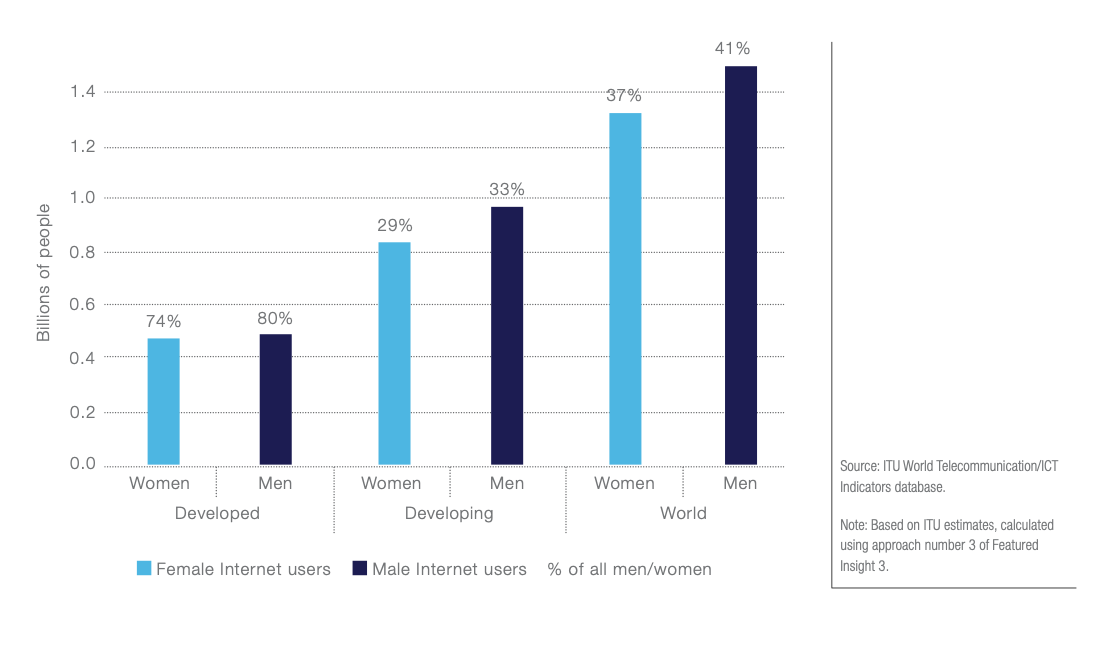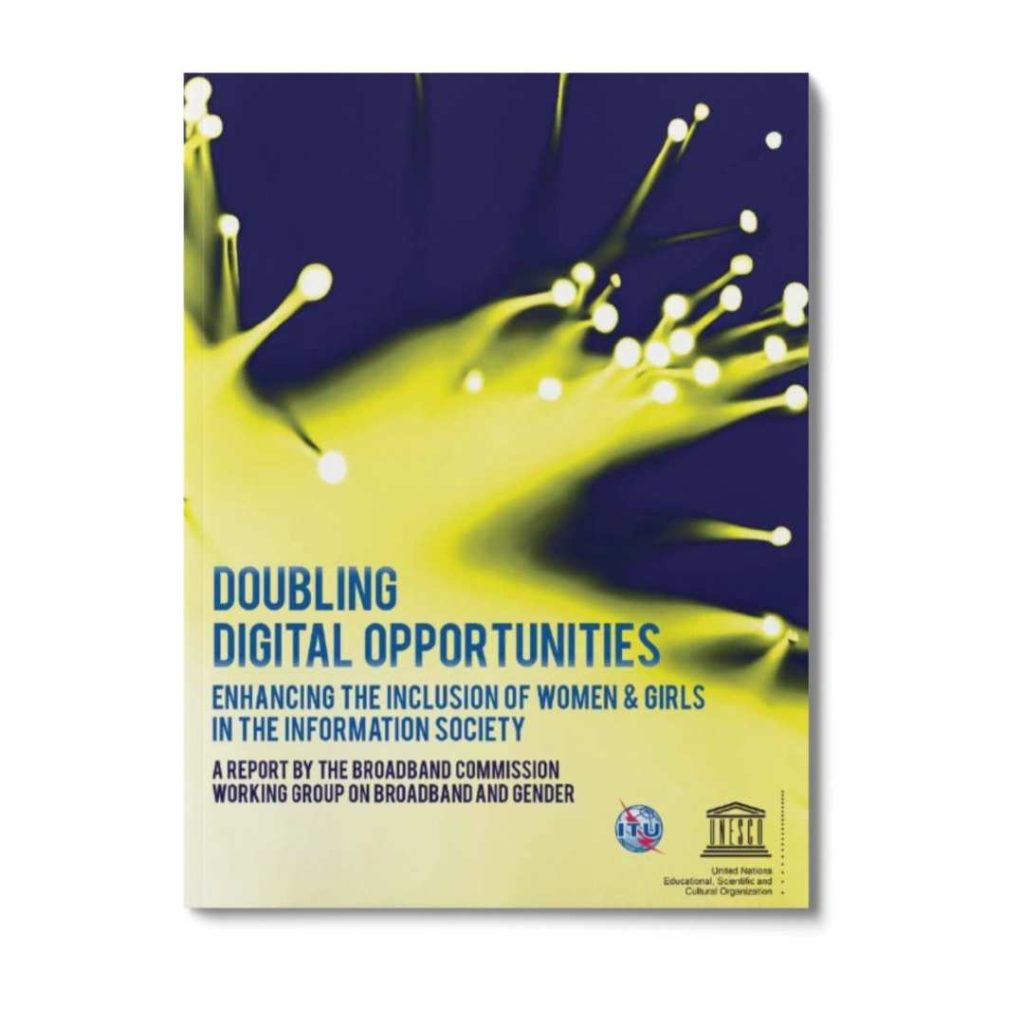How can we empower women through digital literacy training and skills building?
To unlock the full potential of the Internet for sustainable development, women need to have the knowledge and freedom to effectively use ICTs.
The Broadband Commission for Sustainable Development’s 2013 Working Group on Broadband and Gender was co-chaired by Ms. Phumzile Mlambo-Ngcuka, Executive Director of UN Women, and Ms. Helen Clark, Administrator of the UNDP. The Working Group’s outcome Report frames the challenges and opportunities women have faced in achieving gender equality in an era of rapid technological change. The report closely examined critical gender issues with respect to new information and communication technologies (ICTs) and broadband, and it shows ways in which we could further advance the Sustainable Development Agenda by promoting the use of new technologies in support of gender equality and women’s empowerment.
Setting the Stage
Background Overview
Internet Use by Gender
In 2013, women were disproportionately under-represented in information-communications technology (ICT) employment. According to the Working Group’s 2013 Report, in the OECD (Organization for Economic Co-operation and Development) countries, women accounted for less than 20% of ICT specialists. As demonstrated by the bar graph from the Working Group’s 2013 Report included below, women across the world were using the internet at lower rates than men.

The Economics of Gender Equality in ICTs
On the macroeconomic level, more women are needed in ICT to drive industry and economic growth. Equality in access to ICTs is not only a key human rights issue; it also makes sound commercial and economic sense. As referenced in the Working Group on Broadband and Gender’s report, research produced by Intel in 2013 estimated that bringing 600 million additional women and girls online could boost global GDP by up to US$13-18 billion, and research from the World Bank (2009) estimated that every 10% increase in access to broadband results in 1.38% growth in Gross Domestic Product (GDP) for developing countries. Finding ways to include women in the value-building tools of the Internet and ICT will be an important and impactful task for years to come.
Gender References in National Broadband Plans
One of several important steps towards including women in digitalization processes is including mention of gender in national broadband plans. The four categories of gender references in National Broadband Plans included in the Working Group’s 2013 Report include: 1) Actions to increase women’s ICT skills; 2) Actions to provide equal access to ICTs for women (promoting digital inclusion); 3) Actions to promote female empowerment through ICTs; and 4) Actions to promote women’s role in decision making (government, private sector) through ICT use. The 2013 Working Group conducted research which compares inclusion of gender in states’ National Broadband Plans, as shown in the following map:

The Way Forward
Conclusions and Recommendations
The Working Group’s 2013 Report, Doubling Digital Opportunities: Enhancing the Inclusion of Women & Girls in the Information Society, explores measures of inequality in access to ICTs, the importance of ICTs in educating and shaping the aspirations and hopes of the next generation of women and girls, and the implications of lack of access to ICTs by girls and women.
The Report captures a range of views and perspectives on the role which new technologies can play in fostering gender equality by engaging the private sector, civil society and women’s organizations, academia, governments, international organizations, and entrepreneurs, and demonstrates that the challenges associated with the introduction and use of new technologies require collective action and innovative partnerships.
The Report also presents an approach to increasing the number of women in ICT careers: firstly, to create demand among girls and women for careers in ICT; secondly, to ensure a better supply of science, technology, engineering and maths education to girls and women; and thirdly, to achieve long-term sustainability by encouraging ICT businesses to attract, recruit, retain and promote women.
The larger strategic recommendations of this Working Group’s report are:
- 1. Integrate Gender and National ICT & Broadband Policies
- 2. Improve Sex-Disaggregated ICT Statistics and Measurement
- 3. Boost the Affordability and Usability of ICT
- 4. Improve Relevant and Local Content Online
- 5. Initiate an Action Plan to Achieve Gender Equality in Access to Broadband by 2020
- Women or girls may be choosing not to go online, or be prevented from going online, because there is a belief that women and girls cannot master technology – but if women fail to go online, they may never master technology, and miss out on acquiring vital ICT skills which are helpful in everyday life, and increasingly essential in the modern digital economy.
The Working Group Model
Composition and Activities
- Hamadoun Toure, ITU
- Reza Jafari, E-Development International
- Jasna Matic, Serbia
- Dr. Hessa Al Jaber, Qatar
- Saad Bin Dhafer A;-Qahtani, STC
- Amir Dossal, World Partnerships Forum
- Suvi Linden, Finland
- Kathy Calvin, UN Foundation
- Michael Combes, Alcatel-Lucent
- Irina Bokova, UNESCO
- Supachai Panitchpakdi, UNCTAD
- Julius Genachowski, The Carlyle Group
- Paul Jacobs, Qualcomm
- Paul Mitchell, Microsoft
- John Chambers, CISCO
- Kim Seang-tae, National Information Society Agency
- Hans Vestberg, Ericsson
- Speranza Ndege, Kenyarra University
- Anne Bouverot, GSMA
- Akhtar Badshah Microsoft
- Margaret Chan WHO
- Ann Mei Chang US State Department
- Kate Cornick University of Melbourne
- Geena Davis Geena Davis Institute on Gender in Media
- Chat Garcia-Ramilo Association for Progressive Communications
- Ann Glover Chief Scientific Advisor, European Commission
- Nancy Hafkin Women in Global Science and Technology
- Omobola Johnson Federal Ministry of Communication Technology, Nigeria
- Sonia Jorge Alliance for Affordable Internet
- Jeni Klugman The World Bank
- Cheryl D. Miller Zen Digital
- Amina J. Mohammed United Nations
- Monique Morrow Cisco
- Antonella Notari-Vischer Womanity.org
- Miguel Raimilla Telecentre.org Foundation
- Juliana Rotich Ushahidi
- Zainab Salbi Women 4 Women Intl.
- Deborah Taylor Tate Tech Needs Girls
- Renee Wittemyer INTEL
- Anita Gurumurthy IT for Change
1. The Working Group was set up at the Broadband Commission sixth meeting on 23 September 2012 in New York.
2. Ms. Geena Davis, actor, advocate and ITU Special Envoy for Women and Girls, challenged the Commission to address the issues related to women and ICTs. The Commission launched the Working Group focused on the subject and requested Ms. Helen Clark, Administrator, UNDP, to be its Chair.
3. The group has held 1st meeting via teleconference on 29 January 2013, when Terms of Reference for the Working Group were endorsed.
4. Working Group met at first physical meeting in 16 March 2013, alongside the meeting of the Commission in Mexico City on 16 March 2013.
5. The Working Group’s second physical meeting was held in New York, USA on 20 September 2013 in UN Women HQ.
Focus Area
Outcome Resources
Co-Chairs
Ms. Phumzile Mlambo-Ngcuka
Executive Director, UN Women
&
Ms. Helen Clark
Administrator of the UNDP
Broadband Advocacy Targets
SDGs








